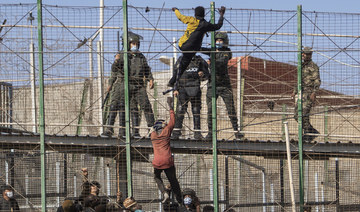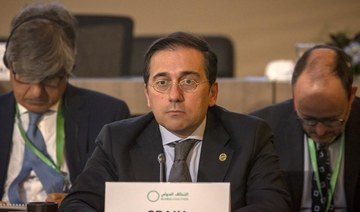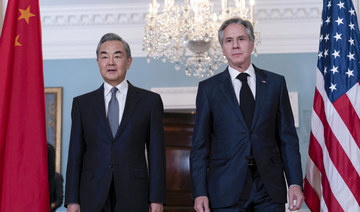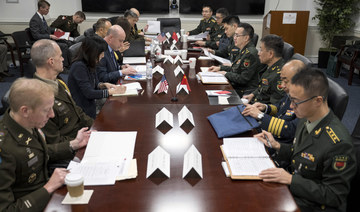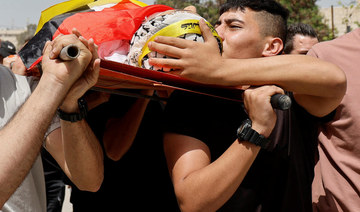NAIROBI: The African Union Commission chief has voiced his shock at the “violent and degrading” treatment of African migrants trying to cross from Morocco into Spain after 23 people died, and called for an investigation into the incident.
About 2,000 migrants stormed the heavily fortified border between the Moroccan region of Nador and the Spanish enclave of Melilla on Friday.
At least 23 migrants died and 140 police officers were wounded in the ensuing violence, according to Moroccan authorities. It was the heaviest toll in years from such attempts to cross the frontier at Melilla.
“I express my deep shock and concern at the violent and degrading treatment of African migrants attempting to cross an international border from Morocco into Spain,” AU Commission chief Moussa Faki Mahamat said in a statement on Twitter late Sunday.
“I call for an immediate investigation into the matter and remind all countries of their obligations under international law to treat all migrants with dignity and to prioritize their safety and human rights, while refraining from the use of excessive force.”
Kenya’s ambassador to the United Nations, Martin Kimani, said a UN Security Council meeting would be held behind closed doors on Monday to discuss the violence African migrants face in Melilla.
Kenya, Gabon and Ghana — the African non-permanent members of the Security Council — called for the meeting, he said.
“Migrants are Migrants: whether from Africa or Europe, they do not deserve to be brutalized in this way,” Kimani wrote on Twitter.
Speaking at a regular press briefing, UN chief Antonio Guterres’s spokesman Stephane Dujarric said: “We very much deplore this tragic incident and the loss of life.”
Spain on Monday thanked Morocco for its “collaboration” in the defense of Spanish borders and once again blamed “international mafias that traffic human beings” for the incident.
But calls for a probe have increased, with around 50 migrant rights groups calling the Melilla deaths “the tragic symbol of European policies to externalize the European Union’s borders.”
“The death of these young Africans... alerts us to the deadly nature of the security cooperation on migration between Morocco and Spain,” they added.
Spain’s rights ombudsman said it accepted a complaint from several NGOs on the incident and has requested information from the relevant administrative bodies.
The migrant rush in Melilla came after Madrid and Rabat normalized their diplomatic relations following an almost year-long crisis centered on the disputed Western Sahara territory.
For Spain, the main objective of the diplomatic thaw was to ensure Morocco’s cooperation in controlling illegal immigration.
Spain’s enclaves in Morocco, Melilla and Ceuta, are the only land borders the European Union shares with Africa.
AU urges probe into deaths of Africans at Spain-Morocco border
https://arab.news/9mssz
AU urges probe into deaths of Africans at Spain-Morocco border
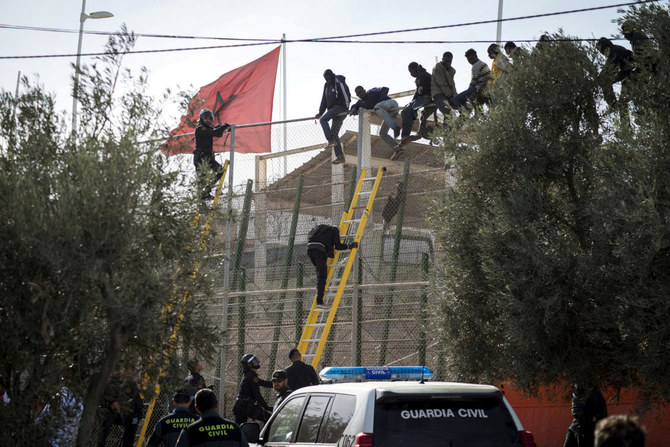
- AU Commission chief Moussa Faki Mahamat: I express my deep shock and concern at the violent and degrading treatment of African migrants attempting to cross an international border
- Spain’s enclaves in Morocco, Melilla and Ceuta, are the only land borders the European Union shares with Africa
Wave of pro-Palestinian campus protests in US meets forceful response
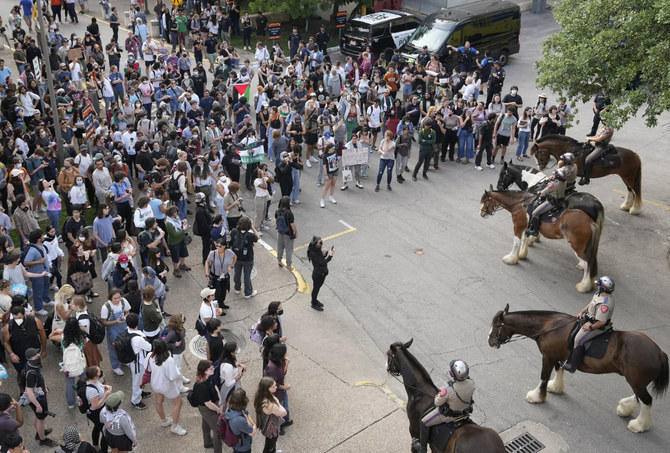
- Fresh clashes between police and students opposed to Israel’s war in Gaza broke out on Thursday
- Questions abound over forceful methods being used to shut down intensifying protests
NEW YORK: Fresh clashes between police and students opposed to Israel’s war in Gaza broke out on Thursday, raising questions about forceful methods being used to shut down protests that have intensified since mass arrests at Columbia University last week.
Over the past two days, law enforcement at the behest of college administrators have deployed Tasers and tear gas against students protesters at Atlanta’s Emory University, activists say, while officers clad in riot gear and mounted on horseback have swept away demonstrations at the University of Texas in Austin.
At Columbia, the epicenter of the US protest movement, university officials are locked in a stalemate with students over the removal of a tent encampment set up two weeks ago as a protest against the Israeli offensive.
The administration, which has already allowed an initial deadline for an agreement with students to lapse, has given protesters until Friday to strike a deal.
Other universities appear determined to prevent similar, long-running demonstrations to take root, opting to work with police to shut them down quickly and in some cases, with force.
Overall, more than 530 arrests have been made in the last week across major US universities in relation to protests over Gaza, according to a Reuters tally. University authorities have said the demonstrations are often unauthorized and called on police to clear them.
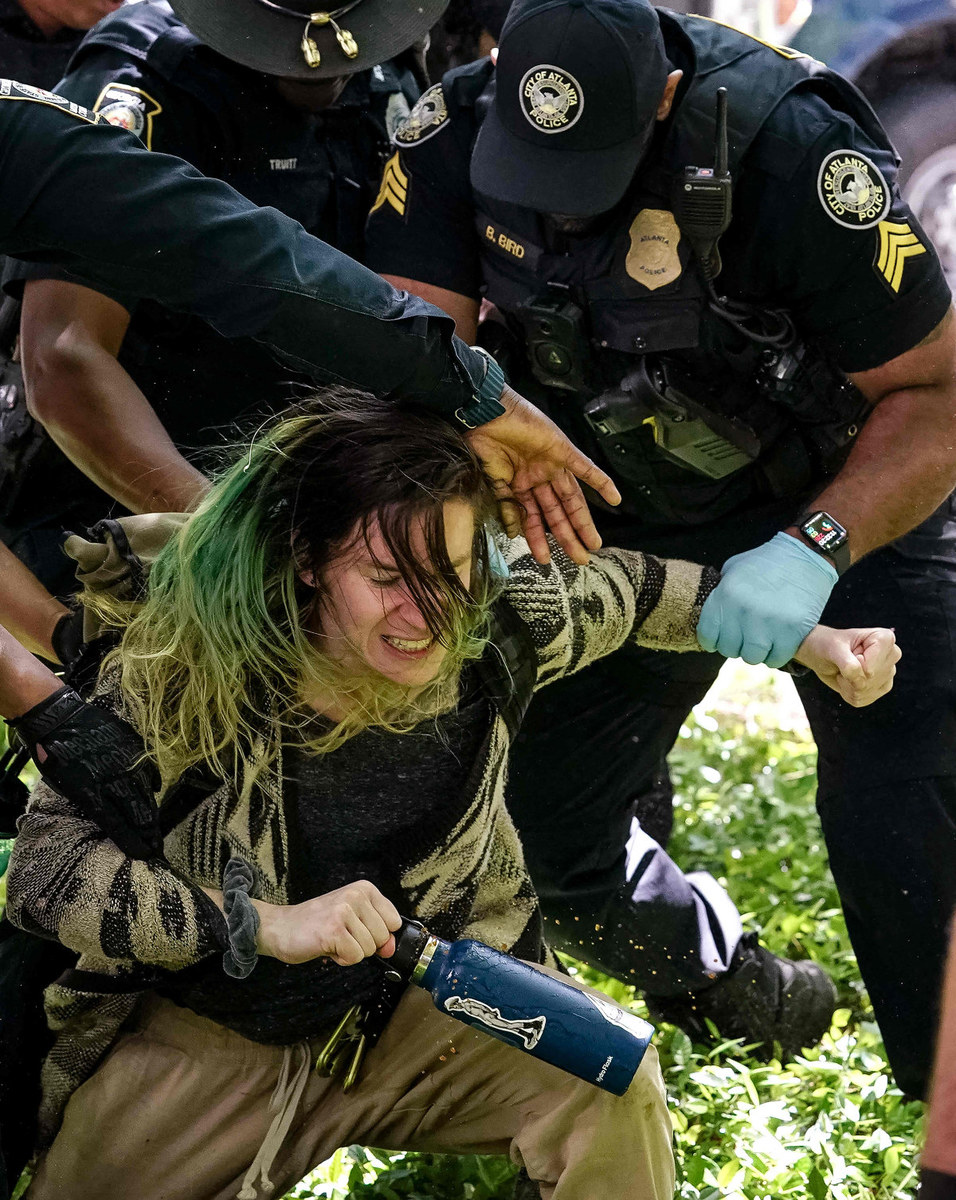
At Emory, police detained at least 15 people on its Atlanta campus, according to local media, after protesters began erecting a tent encampment in an attempt to emulate a symbol of vigilance employed by protesters at Columbia and elsewhere.
The local chapter of the activist group Jewish Voice for Peace said officers used tear gas and Tasers to dispense the demonstration and take some protesters into custody.
Video footage aired on FOX 5 Atlanta showed a melee breaking out between officers and some protesters, with officers using what appeared to be a stun gun to subdue a person and others wrestling other protesters to the ground and leading them away.
“Several dozen protesters trespassed into Emory University’s campus early Thursday morning and set up tents,” the school wrote in response to an emailed request for comment. It described the protesters as “activists attempting to disrupt our university,” but did not comment directly on the reports of violence.
Atlanta police did not immediately respond to inquiries about the number of protesters who were detained or about reports over the use of tear gas and stun guns.
Similar scenarios unfolded on the New Jersey campus of Princeton University where officers swarmed a newly-formed encampment, video footage on social media showed.
Boston police earlier forcibly removed a pro-Palestinian encampment set up by Emerson College, arresting more than 100 people, media accounts and police said. The latest clashes came a day after police in riot gear and on horseback descended on hundreds of student protesters at the University of Texas at Austin and arrested dozens of them.
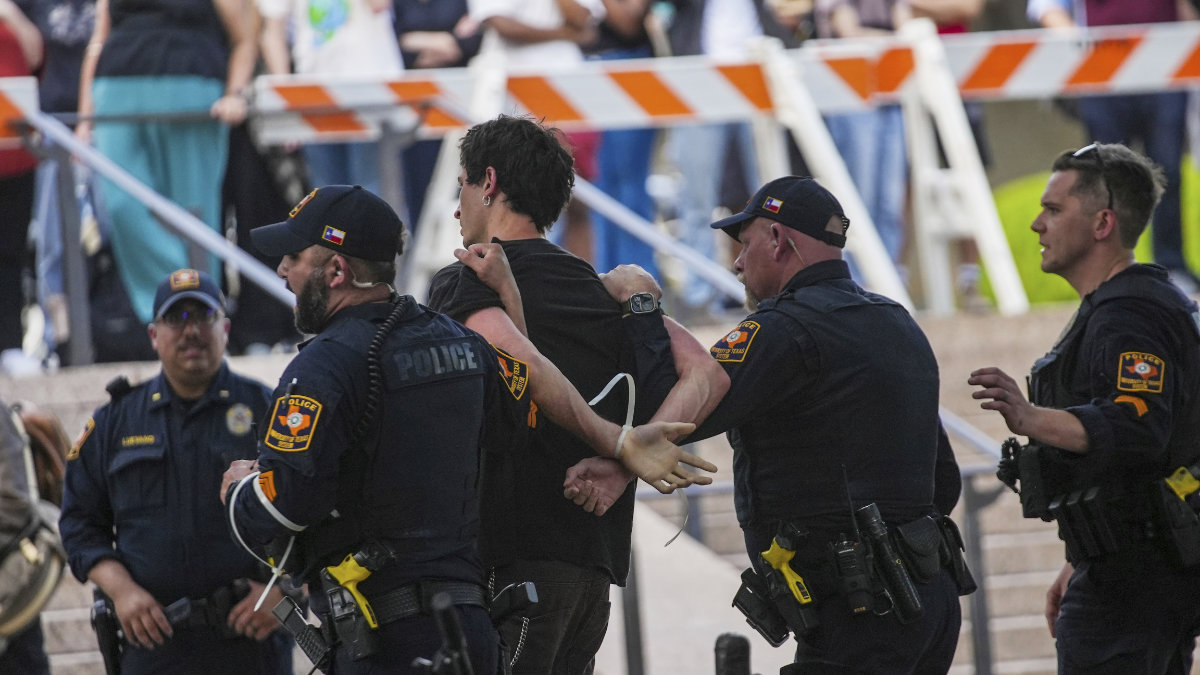
But prosecutors on Thursday dropped charges against most of the 60 people taken into custody, mostly on misdemeanor charges of criminal trespassing and disorderly conduct, and said they would proceed with only 14 of those cases.
In dropping the charges, the Travis County district attorney cited “deficiencies in the probable cause affidavits.”
‘Alarming reports’
Human Rights Watch and the American Civil Liberties Union have condemned the arrest of protesters and urged authorities to respect their free speech rights.
But some Republicans in Congress have accused university administrators of allowing Jewish students to be harassed, putting increasing pressure on schools to tightly control any demonstrations and to block any semi-permanent encampment.
US Education Secretary Miguel Cardona on Thursday said his department was closely monitoring the protests, including what he called “very alarming reports of antisemitism.”
In response, activist groups have strongly denied that the protests are antisemitic. Their aim is to pressure universities from divesting from companies that contribute to the Israeli military actions in Gaza, they say.
Even so, protest leaders have acknowledged that hateful rhetoric has been directed at Jewish students, but insist that people who tried to infiltrate and malign their movement are responsible for any harassment.

Friday deadline at Columbia
At Columbia, officials have given protesters until 4 a.m. on Friday to reach an agreement with the university on dismantling dozens of tents set up on the New York City campus in a protest that started a week ago.
An initial deadline of midnight Tuesday came and went without an agreement, but administrators extended it for 48 hours, citing progress in the talks.
The university already tried to shut the protest down by force. On April 18, Columbia President Minouche Shafik took the unusual move of asking police to enter the campus, drawing the ire of many rights groups, students and faculty.
More than 100 people were arrested and the tents were removed from the main lawn. But within a few days, the encampment was back in place, and the university’s options appeared to narrow.
Protesters have vowed to keep the protests going until their universities agree to disclose and divest any financial holdings that might support the war in Gaza, and grant amnesty to students suspended from school during the demonstrations.
Student protesters have also demanded that the US government rein in Israeli strikes on civilians in Gaza, which have killed more than 34,000 people, according to Palestinian health authorities. Israel is retaliating against an Oct. 7 Hamas attack that killed 1,200 people and led to 253 taken hostage, according to Israeli tallies.
India begins voting in second phase of election as Modi vs Gandhi campaign heats up
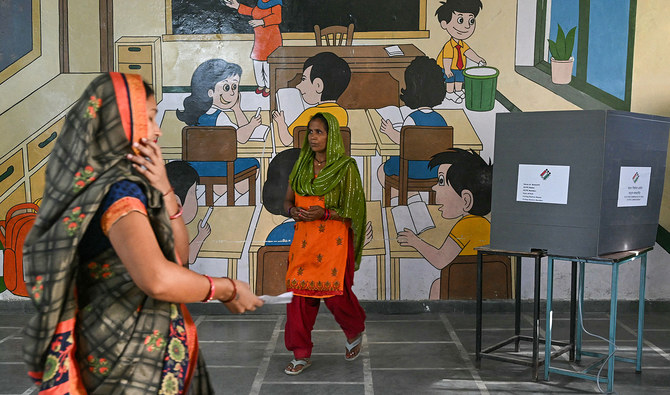
- Almost one billion people eligible to vote in seven-phase general elections that began on April 19 and concludes on June 1
- Modi is seeking record third straight term on the back of economic record, welfare measures, Hindu nationalism
BENGALURU/KOTTAYAM/MATHURA: India began voting on Friday in the second phase of the world’s biggest election, as Prime Minister Narendra Modi and his rivals raise the pitch of the campaign by focusing on hot-button issues such as religious discrimination, affirmative action and taxes.
Almost one billion people are eligible to vote in the seven-phase general elections that began on April 19 and concludes on June 1, with votes set to be counted on June 4.
Modi is seeking a record-equalling third straight term on the back of his economic record, welfare measures, national pride, Hindu nationalism and personal popularity. Surveys suggest he will easily win a comfortable majority.
His challengers have formed an alliance of more than two dozen parties and are promising greater affirmative action, more handouts and an end to what they call Modi’s autocratic rule.
Friday’s polling will be held for 88 of the total 543 seats in the lower house of parliament with 160 million people eligible to vote. It will be spread across 13 states and federal territories in the world’s most populous country.
More than half of those 88 seats are in the southern states of Kerala and Karnataka and the northwestern state of Rajasthan.
The campaign has changed tack since the first phase and become heated as Modi and the main opposition Congress party have faced off on communal issues with Modi accusing Congress of favoring minority Muslims, aiming to dilute affirmative action and planning to impose inheritance tax.
“Congress, which used to make noise in the name of the Constitution, has now been badly exposed for its hidden agenda,” Modi posted on X late on Thursday.
Congress has denied the charges and said Modi is distracting voters from real issues such as unemployment, price rise and rural distress and fears losing.
RAHUL GANDHI IN THE FRAY
“We spoke to you, we heard what was on your mind and drafted a revolutionary manifesto,” Congress leader Rahul Gandhi said in a video message on the eve of the vote. “This has been drafted by the Congress party but it is your voice.”
Gandhi, former Congress president and the face of the party, is among the 1200 candidates in the fray on Friday.
He is seeking re-election from Wayanad in Kerala and faces Annie Raja of the Communist Party of India (CPI) and BJP’s K. Surendran, among others, in the Left Front-ruled state.
In 2019, Gandhi defeated the CPI candidate by more than 400,000 votes, the highest margin in Kerala, although he lost his second seat to BJP in the family bastion of Amethi in north India. India allows a candidate to contest from more than one seat but they can retain only one if they win from more.
Congress slumped to a historic low when it was swept out of power by BJP in 2014 and won its second-lowest number of 52 seats in 2019, with Kerala contributing the highest of 15.
The party is also expected to do better in Karnataka where it won just one of 28 seats in 2019 but gained strength and defeated BJP in state elections last year.
It is still seen to be struggling nationally as bickering within the opposition alliance it leads and graft cases against some leaders has hobbled its challenge to Modi.
The Election Commission and political parties have been worried about voter turnout due to the summer heat and wedding season in some parts of the country with turnout falling to around 65 percent in the first phase from nearly 70 percent in 2019.
The poll panel has increased appeals for voter participation since, asking them to “vote with responsibility and pride.”
Ex-tabloid publisher testifies he scooped up possibly damaging tales to shield his old friend Trump

- David Pecker, publisher of the tabloid National Enquirer, has testified that his publication helped buy stories about Trump's extramarital affairs to keep them from getting out
- His testimony was a critical building block for the prosecution’s theory that their partnership was a way to illegally influence the 2016 presidential election
NEW YORK: As Donald Trump was running for president in 2016, his old friend at the National Enquirer was scooping up potentially damaging stories about the candidate and paying out tens of thousands of dollars to keep them from the public eye.
But when it came to the seamy claims by porn performer Stormy Daniels, David Pecker, the tabloid’s longtime publisher, said he put his foot down.
“I am not paying for this story,” he told jurors Thursday at Trump’s hush money trial, recounting his version of a conversation with Trump’s former lawyer Michael Cohen about the catch-and-kill scheme that prosecutors alleged amounted to interference in the race. Pecker was already $180,000 in the hole on other Trump-related stories by the time Daniels came along, at which point, he said, “I didn’t want to be involved in this.”
Pecker’s testimony was a critical building block for the prosecution’s theory that their partnership was a way to illegally influence the 2016 presidential election. The Manhattan district attorney is seeking to elevate the gravity of the history-making first trial of a former American president and the first of four criminal cases against Trump to reach a jury.
Trump’s lawyers also began their cross-examination of Pecker, using the time to question his memory of years-old events and to suggest his account had evolved over time.
But the hush money trial was just one of the consequential legal matters facing the Republican presidential candidate on Thursday.

The US Supreme Court also heard arguments over whether Trump should be immune from criminal prosecution while he was the president, stemming from federal charges over his efforts to reverse his 2020 election loss to Joe Biden. The high court justices appeared likely to reject his claims of absolute immunity, though it seemed very possible that trial could be delayed beyond November’s election.
Trump’s many legal problems collided this week. The hush money case includes a looming decision on whether he violated a gag order and should be held in contempt. His former lawyers and associates were indicted in a 2020 election-related scheme in Arizona. And a New York judge rejected a request for a new trial in a defamation case that found Trump liable for $83.3 million in damages.
But the former president has a long history of emerging unscathed from sticky situations — if not becoming even more popular.
The Supreme Court’s decision will have lasting implications for future presidents, because the justices were seeking to answer the never-before-asked question of whether and to what extent does a former president enjoy immunity from prosecution for conduct during his time in office. But it may not impact the New York City case, which hinges mostly on Trump’s conduct as a presidential candidate in 2016 — not as a president.
Trump had asked to skip his New York criminal proceedings for the day so he could sit in on the Supreme Court’s special session, but that request was denied by Judge Juan M. Merchan, who is overseeing Trump’s trial on 34 felony counts of falsifying business records in connection with the hush money payments, which involved buying the rights to someone’s story but never publishing it.
“I think the Supreme Court has a very important argument before it today,” Trump said outside the courtroom. “I should be there.”
Instead, he sat at the defense table in a Manhattan courtroom with his lawyers, listening intently to Pecker testify how he and his publication parlayed rumor-mongering into splashy stories that smeared Trump’s opponents and, just as crucially, leveraged his connections to suppress unflattering coverage.
Trump has maintained he is not guilty of any of the charges, and says the stories that were bought and squelched were false.
“There is no case here. This is just a political witch hunt,” he said before court in brief comments to reporters.
As Pecker testified in a calm, cooperative tone about risque tales and secret dealings, the atmosphere in the utilitarian 1940s courtroom was one of quiet attentiveness. Two Secret Service agents were stationed in the first row of the courtroom gallery directly behind Trump. Ten court officers stood around the room. Jurors intently listened, and some took notes.
Pecker recalled that the publication bought a sordid tale from a New York City doorman and purchased accusations of an extramarital affair with former Playboy model Karen McDougal to prevent the claims from getting out. There was some talk of reimbursement from Trump’s orbit, but Pecker was ultimately never paid.
The breaking point came with Daniels, who was eventually paid by Cohen to keep quiet over her claim of a 2006 sexual encounter with Trump. The ex-president denies it happened.
Pecker recalled to the jury that he was dining with his wife the night after the public learned of the infamous 2005 “Access Hollywood” tape in which Trump discussed grabbing women sexually without permission, when then-editor Dylan Howard called with an urgent matter.
Howard said he heard from Daniels’ representatives that she was trying to sell her story and that the tabloid could acquire it for $120,000, Pecker told jurors. Pecker was tapped out; he told Cohen as much.
At the same time, Pecker advised that someone — just not him — should do something to prevent the story from going public.
“I said to Michael, ‘My suggestion to you is that you should buy the story, and you should take it off the market because if you don’t and it gets out, I believe the boss will be very angry with you.’”
Cohen followed his advice.
Pecker testified that Trump later invited him to a White House dinner in July 2017 to thank him for helping the campaign. The ex-publisher said Trump encouraged him to bring anyone he wanted, recounting that the then-president told him, “It’s your dinner.”
Pecker said that he and Howard, as well as some of his other business associates, posed for photos with Trump in the Oval Office. Pecker said others at the dinner included Trump son-in-law Jared Kushner and press adviser Sean Spicer.
At one point during the evening, Pecker said Trump asked him for an update on Karen McDougal.
“How’s Karen doing?” he recalled Trump saying as they walked past the Rose Garden from the Oval Office to the dining room.
“I said she’s doing well, she’s quiet, everything’s going good,” Pecker testified.
But months later, in March 2018, the president became furious when McDougal gave an interview to CNN’s Anderson Cooper, Pecker testified.
“I thought you had and we had an agreement with Karen McDougal that she can’t give any interviews or be on any TV channels,” Trump told Pecker by phone, the former National Enquirer publisher said.
He said he explained to the then-president that the agreement had been changed to allow her to speak to the press after a November 2016 Wall Street Journal article about the tabloid’s $150,000 payout to McDougal.
“Mr. Trump got very aggravated when he heard that I amended it, and he couldn’t understand why,” Pecker told jurors.
Later, Trump defense attorney Emil Bove opened his cross-examination by grilling Pecker on his recollection of specific dates and meanings. He appeared to be laying further groundwork for the defense’s argument that any dealings Trump had with the National Enquirer publisher were intended to protect himself, his reputation and his family — not his campaign.
In other developments, prosecutors argued Trump again violated a gag order, all while waiting to hear whether he would be held in contempt on other suspected violations. Merchan has barred the GOP leader from making public statements about witnesses, jurors and others connected to the case. He set a hearing for next Thursday on the new claims.
Trump was dismissive about the looming decision. When asked by reporters if he would pay fines if ordered, he replied, “Oh, I have no idea.” He then said, “They’ve taken my constitutional right away with a gag order.”
A conviction by the jury would not preclude Trump from becoming president again, but because it is a state case, he would not be able to pardon himself if found guilty. The charge is punishable by up to four years in prison — though it’s not clear if the judge would seek to put him behind bars.
China warns Blinken over deteriorating ties in talks
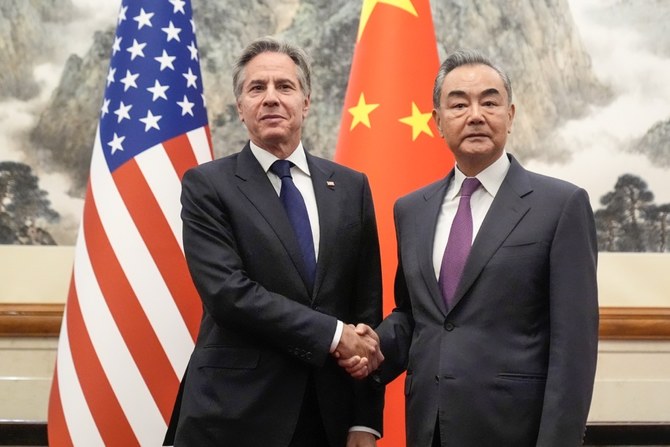
BEIJING: China on Friday urged US Secretary of State Antony Blinken to address rising disagreements or risk a “downward spiral” between the two powers as talks opened in Beijing.
Blinken, paying his second visit to the rival country in less than a year, voiced hope for progress but said he would directly raise areas of difference, which are expected to include Russia, Taiwan and trade.
Chinese Foreign Minister Wang Yi, receiving Blinken at the Diaoyutai state guesthouse in the capital’s ancient gardens, said relations between the world’s two largest economies were “beginning to stabilize” after leaders Joe Biden and Xi Jinping met at a November summit.
“But at the same time, the negative factors in the relationship are still increasing and building,” Wang said.
“The relationship is facing all kinds of disruptions. China’s legitimate development rights have been unreasonably suppressed and our core interests are facing challenges,” he said.
“Should China and the United States keep in the right direction of moving forward with stability, or return to a downward spiral?
“This is a major question before our two countries and tests our sincerity and ability.”
Blinken’s aides previously said he would address a range of concerns including China’s support for Russia, which has rapidly rebuilt its military base two years into its invasion of Ukraine.
As he opened the meeting with Wang, Blinken said he would be “very clear, very direct,” but added: “I hope we make some progress on the issues our presidents agreed” on.
The two countries should be as “clear as possible about the areas where we have differences — at the very least to avoid misunderstandings, to avoid miscalculations,” Blinken said.
“That really is a shared responsibility that we have not only for our own people, but for people around the world.”
France threatens new sanctions against West Bank settlers
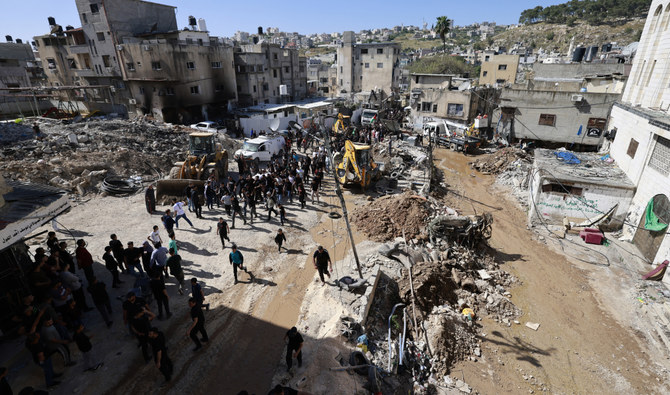
- In February, 28 ‘extremist Israeli settlers’ were banned from entering French territory
- At least 488 Palestinians have been killed by Israeli troops or settlers in the West Bank since October 7, according to Palestinian officials
PARIS: France is considering extending sanctions on Israeli settlers behind violence against Palestinian civilians in the occupied West Bank, President Emmanuel Macron’s office said he spoke with Jordan’s King Abdullah II.
The two leaders “firmly condemned recent Israeli announcements about settlements” in the West Bank, “which are contrary to international law,” Macron’s office said in a statement.
Tensions have mounted in the occupied territories since the Hamas October 7 attack on Israel that set off the Gaza war. At least 488 Palestinians have been killed by Israeli troops or settlers in the West Bank since October 7, according to Palestinian officials.
In February, 28 “extremist Israeli settlers” were banned from entering French territory. Last week the European Union imposed sanctions on four Israeli settlers and two settler organizations for violence against Palestinians in the West Bank and Jerusalem.
Since the start of the year, Israeli authorities have declared nearly 1,100 hectares (2,720 acres) of the West Bank to be “state land” — twice as much as in the previous record year in 1999, according to the settlement watchdog Peace Now.
The status gives the government full control over how the land is used, inevitably leading it to being declared off-limits to Palestinians.
Some 490,000 Israeli settlers now live in the West Bank alongside three million Palestinians.
Macron and King Abdullah also spoke about the “catastrophic humanitarian situation in Gaza” and expressed “great concern about the perspective of an Israeli offensive on Rafah, where more than 1.5 million people are seeking refuge, and reiterated their opposition to such an operation,” the statement said.
“The two also insisted on the necessity of an immediate and durable ceasefire to allow massive deliveries of urgent aid and the protection of civilian populations,” it added.
Macron also “repeated that the liberation of hostages held by Hamas was an absolute priority for France.”



